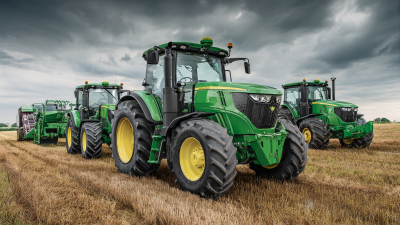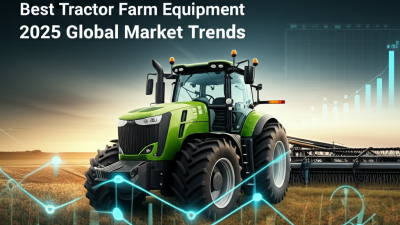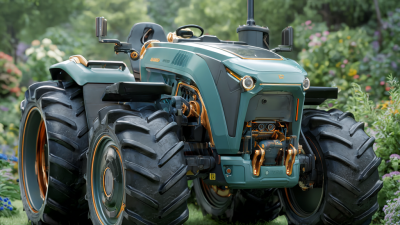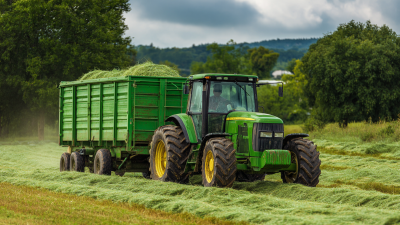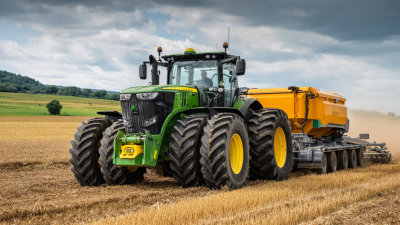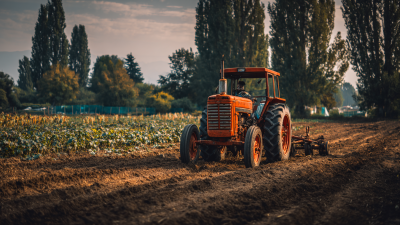When it comes to modern farming, selecting the right agriculture tractor is a crucial decision that can significantly impact your productivity and efficiency. With an overwhelming variety of models and features available, understanding how to choose the best agriculture tractor tailored to your specific farming needs can seem daunting. This guide aims to simplify the process by providing essential insights into the various types of tractors, their capabilities, and the factors you should consider before making a purchase. Whether you are a small-scale farmer or managing a large agricultural enterprise, our comprehensive recommendations will help you navigate the complexities of tractor specifications, budget constraints, and technological advancements, ensuring that you make an informed choice that maximizes your farm's potential.

When selecting the best agriculture tractor, it's crucial to first understand your specific farming requirements. Different tasks call for different capabilities, making it essential to assess the type of crops you cultivate, the size of your farm, and the kind of soil you work with. For example, if you're working in soft, uneven terrain, a tractor equipped with a conversion track system could enhance traction and reduce soil compaction, making it easier to maneuver and perform various tasks efficiently.

Moreover, as the agricultural sector evolves, new technologies are transforming the machinery landscape. With the global agriculture tractor market projected to grow significantly over the coming years, it's vital to stay informed about advancements, such as energy-efficient models and automation options. These innovations not only improve productivity but also offer sustainability benefits that can align with modern farming practices. Understanding these trends along with your farming needs will undoubtedly guide you in selecting the right tractor that can cater to your operational demands effectively.
When selecting the best agriculture tractor for your farming needs, it's crucial to understand the key features that significantly impact performance and efficiency. Modern agriculture tractors are equipped with advanced technologies that enhance productivity. For instance, tractors that integrate precision farming technologies, such as GPS navigation and automated steering, allow farmers to optimize field operations, reducing input costs and labor.
A notable trend in the industry is the rising demand for electric tractors, with the market value expected to exceed $305.8 million in 2023. Analysts predict a robust compound annual growth rate of over 13% from 2024 to 2032. This growth is driven by increasing environmental concerns and a shift towards sustainable farming practices. As farmers seek to minimize their carbon footprint, choosing tractors that offer energy efficiency and lower emissions becomes increasingly important.
Additionally, essential features such as horsepower, fuel capacity, and versatility should be carefully considered. Tractors with higher horsepower can tackle more demanding tasks, while those with adaptability for various implements—like plows and seeders—provide better overall value. As the agricultural landscape evolves, investing in the right tractor equipped with the necessary features will remain vital for maximizing productivity and ensuring sustainable farming practices.

When selecting a tractor, it’s essential to understand the different types available and their specific uses in farming. For instance, utility tractors are versatile machines ideal for a range of tasks, from plowing and tilling to hauling materials. They come in various horsepower ratings, allowing farmers to choose one that best fits their workload and land size. Compact tractors are perfect for smaller farms or for tasks that require agility, such as mowing or landscaping.
Tip: Evaluate your farm's specific needs before purchasing. Consider factors like the size of your land, the type of crops you cultivate, and the tasks you will perform regularly. This evaluation can help you narrow down the tractor options that suit your farming style.
Additionally, specialty tractors, such as row-crop or orchard tractors, are designed for specific applications. Row-crop tractors are ideal for crops planted in rows, providing the ability to maneuver in tight spaces. Orchard tractors, on the other hand, are designed with a narrow profile, making them excellent for working between tree rows without damaging the crops.
Tip: Always test-drive different tractor models before making a decision. Getting a feel for the machine's controls, comfort, and maneuverability can significantly impact your efficiency and ease during long work hours.
When selecting the best agriculture tractor for your farming needs, evaluating budget considerations and financing options becomes a crucial step in the decision-making process. Tractors can vary significantly in price depending on brand, model, and features, so it’s essential to establish a budget that aligns with your operational goals. Begin by listing your must-have features and assessing how they influence the overall cost. For smaller farms, a compact or utility tractor might be more cost-effective, while larger operations may justify the investment in high-capacity tractors for efficiency and productivity.
In addition to upfront costs, exploring financing options can alleviate the financial burden. Many manufacturers and dealers offer flexible financing plans, including loans and leasing options, making it easier for farmers to manage their cash flow. Additionally, looking into government grants and subsidies aimed at agricultural advancements can provide further financial relief. Carefully analyzing these factors will not only help in choosing the right tractor but also ensure that it is a feasible investment for your farming operation.
| Tractor Type | Horsepower | Price Range ($) | Fuel Type | Financing Options | Ideal Use |
|---|---|---|---|---|---|
| Compact Tractor | 20-40 HP | $15,000 - $25,000 | Diesel | Low-interest loans, leasing options | Small acreage, landscaping |
| Utility Tractor | 40-100 HP | $25,000 - $50,000 | Diesel | Financing through dealers, government programs | Farming, hay production |
| Row Crop Tractor | 70-200 HP | $50,000 - $150,000 | Diesel | Flexible financing options, trade-in deals | Row crop farming, large scale operations |
| 4WD Tractor | 150-600 HP | $100,000 - $300,000 | Diesel | Long-term financing, lease-to-own options | Heavy-duty tasks, large field management |
Proper maintenance is crucial for extending the life of your agricultural tractor, ensuring it remains a reliable asset on the farm. According to a report by the American Society of Agricultural and Biological Engineers, routine maintenance can increase the lifespan of farm equipment by 25% to 50%. Regular oil changes, as suggested by most manufacturers, are essential; they help in removing contaminants and ensuring smooth engine operation. Using high-quality engine oils can also make a significant difference, as they provide better lubrication and reduce friction, ultimately enhancing performance.
Additionally, monitoring tire pressure and tread wear can prevent premature tire failure, which is often overlooked. The Agricultural Engineering Research journal indicates that proper tire maintenance can reduce fuel consumption by up to 10%, substantially lowering operating costs.
Furthermore, conducting seasonal inspections—checking belts, hoses, and hydraulic systems—can catch minor issues before they escalate into costly repairs. Keeping your tractor clean can also prevent rust and corrosion, particularly in harsh agricultural environments. By prioritizing these maintenance practices, farmers can ensure their tractors remain efficient and productive for many years.
